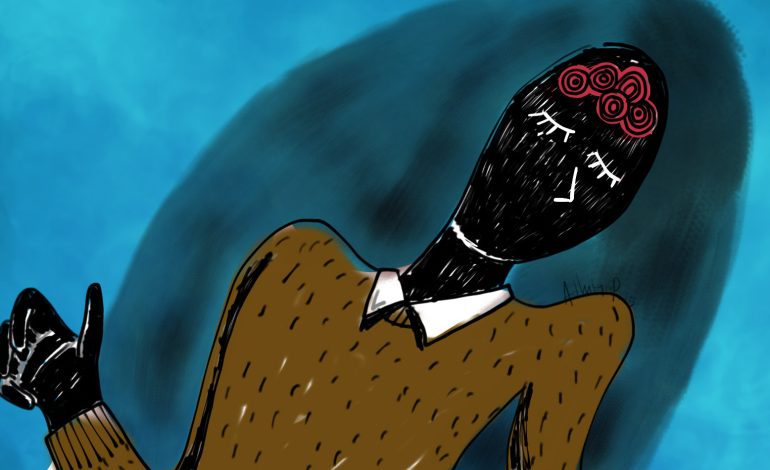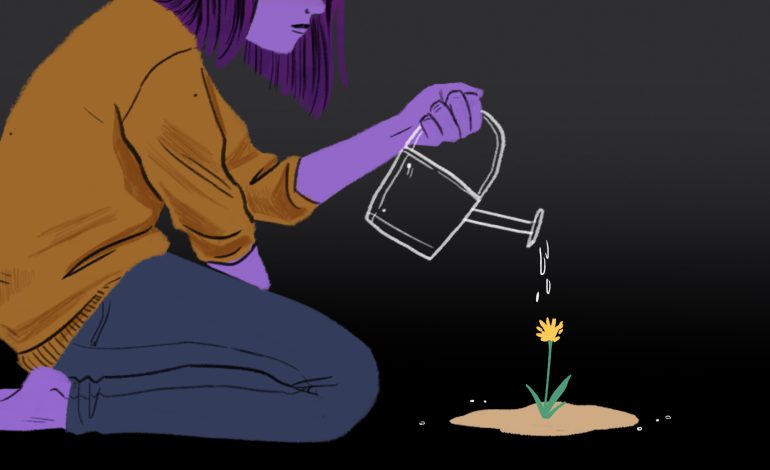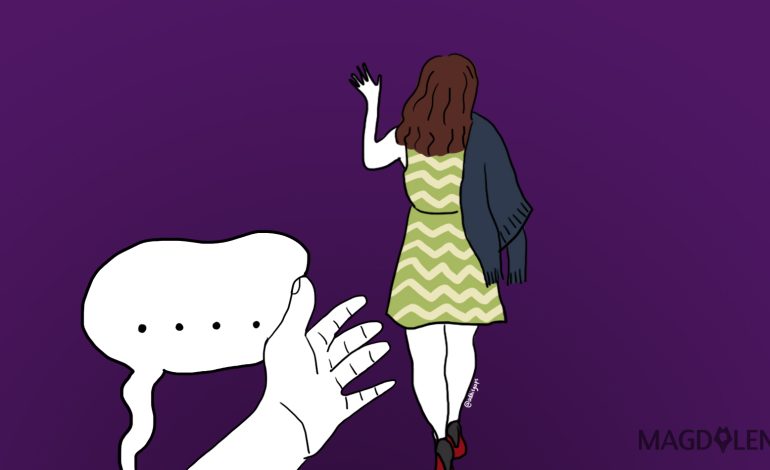How I Come to Grips with My Depression

I am fighting depression and anxiety. I realize that the issue of mental health is heavily stigmatized by many people, in spite of their level of education. I thought that I should share my story to help destigmatize it. These words are not easy.
My dad was always abusive. He physically, verbally and emotionally abused our entire family, but he mostly only physically abused my mother and me. He didn’t beat me into a pulp but I recall the occasional punches and kicks. I remember that the first time he did it, I didn’t even feel pain – I was just consumed by the immense shock. The next beating was when I was sitting with a bowl of cookie dough for my mom’s cookie business. He suddenly started arguing with my mom. He kicked the bowl from my lap, I fell on my back and then he started kicking my stomach. I felt immense pain and anger! It happened again a couple of times, less memorable than before. I became disgusted by any form of his touch on me, especially after he swung an axe in front of my family.
It was 2012. I remember because some people believed that the end of the world would be that year. It wasn’t the end of the world, but it was the closest to doomsday I have ever experienced. My mother left home and then filed for divorce. We followed our brother’s pleas to stay home and consequently remained with our dad too. It was hell. He would force us to talk about the divorce every day because he vehemently refused to be divorced. It always varied between “I don’t want to talk bad about your mother…” and “you know what your mother did?” Sometimes even both. Sometimes the topics were so private, that no children should never hear no matter how old they are. We needed a distraction from this hell. He would say sorry when we asked him not to talk that way, but then he went back to doing it again. Every day was a torture. No wonder my sister left a couple months after that.
My dad somehow relied on me. He thought my little brother was too young (he was 15-year-old) and my big sister was too emotional. As I tried to avoid him relying on me, he thought I was rebelling. He suggested to take me out of the university because I had gotten “rebellious” and he threatened to put me in some sort of Islamic boarding school far away. I was so angry that I punched the wall. I didn’t break my knuckles but it bruised, and I couldn’t use it for days. Even if I would lock myself in my room, he would talk outside my door. Listening to him hurt my head that I would bang my head against the wall. The pain from the head-banging would mask the pain of hearing my dad. At that moment, I remember thinking, “I think if I die, it would feel really nice. It would stop me from this pain.” Every time he forced me into his world of torture I would think about dying. Not exactly killing myself but just to stop living, if living meant having to endure this pain from my father and that I couldn’t run away from him.
I had to get out to survive, so I rented a room near my campus. I said to my dad it was to do my thesis because I wouldn’t be able to commute as much now. Thankfully, he bought that lie.
A couple of weeks staying at the rented room, I felt hopeless. I lost some weight because I had no appetite. I could day dream for hours, just staring at the same spot. I didn’t want to meet anybody. I barely slept. Talking to people about this problem and crying didn’t help anymore as it had been usually. I talked to my sister about it, and she suggested that I saw a psychiatrist. It might be a mild depression, as it persisted for more than two weeks.
Depression sounded plausible as I felt I was trapped in a problematic situation for which I have no solutions of. My mom wanted a divorce, my dad didn’t. I got all the debris, yet the solution was not in my hands.
My psychiatrist diagnosed me with mild to high depression. She suggested anti-depression medication and something to help me sleep. I said I didn’t want any medication, but she said she couldn’t let me not have it since it was already leaning towards high depression due to my self-destructive behavior and suicidal thoughts.
She told me that I should not be alone even though I wanted to. It crushed me to admit that without others’ help I wouldn’t have survived. I told my friends about my condition, therefore sometimes I would need to be a parasite and stay with them.
She suggested that under no circumstances I met my dad because he was my trigger to depression. I was worried because then I would leave my poor brother alone at home. I was worried that if I tell him the reason he would do something dangerous. But she said, “you have to avoid him and lie, if you are sick, you can’t help your brother even more. You need to focus on you to be healthy, so that you can help your brother.” So I did.
My mom wanted a divorce, my abusive dad didn’t. I got all the debris, yet the solution was not in my hands.
Thankfully, three weeks of Zoloft and the rotation of staying between friends helped me immensely. I thought, I had to be better, I had to heal because no matter what, he is still my dad.
A year of separation, hell and not talking to my mom, I took the defense of my thesis. I vividly remember this day because my brother told me he wanted to die over Whatsapp. My teenage brother said that he wanted to die. My brother said that my dad hit him, but my brother blocked him. Hearing that made me so mad and sad. I thought I was unhealthy because it was just me not being strong enough. But if my brother gets sick too, then my dad is the problem. It was not us that was not strong enough. This has got to stop.
So, I went home, took my brother and met with my mom and then afterwards fetched my sister. We ended up staying together while being paranoid of going out because people say that my father has been searching for us all over town and around our schools. That was the first I felt like I was in an action movie. But things gradually got better.
Meeting my depression
On 2015 New Year’s Eve, in a crappy cheap hostel in Rome, I realized that I had been depressed since I came to Sweden in the fall of 2014. The familiar sensation came back: the inability to enjoy the things that used to be fun for me and the failure in completing assignments. I was travelling across Italy from North to South for three weeks, yet I didn’t really enjoy it. I couldn’t read books because I couldn’t concentrate anymore. Sometimes watching something was too difficult and not enjoyable. I had no appetite. I avoided people. I couldn’t seem to get anything done. I slept too much or too little. I felt tired all the time.
I felt a bit better after going to the university psychologist, as it got me to look into myself which I think is interesting. It made me figured out that my academic failure triggered my depression.
I always believed that I was ugly and the only way to compensate for it was to be smart. That was why I was so ambitious. It was existential. Now, in Sweden, I am nothing because being good in academics is all I am and without it I am nothing. Without my academic achievement I am just ugly.
When one is depressed, they will find it very hard to concentrate. So my academic suffered even more. I had an anxiety attack for the first time when I was about to send my thesis proposal. I couldn’t breathe and I couldn’t read.
I was supposed to finish my study in two years but doing thesis while battling anxiety and depression at the same time was really hard. I couldn’t finish my study in time like everyone else. After two years, the scholarship stopped, so I had to find work to support myself. In addition to aforementioned challenges, the financial stress struck me hard. Without fluency in Swedish, I had to find work. I was scraping anything I can do: from cleaning people’s house, babysitting, cooking, waitressing. Some of these jobs even pay far below minimum wage. I worked really hard.
Guilt is prominent when I am depressed and anxious. I was aware that God has given such me a wonderful life yet I am wasting it away.
All that pressure made it impossible for me to do my thesis. At the end of 2016, I experienced a serious mental breakdown. I cried every day. So after that I took a step for a long-term therapy. I also took a school break so that I could put away the thesis pressure over my head until I am better.
Guilt is prominent when I am depressed and anxious. I was aware that God has given such me a wonderful life, especially the scholarship, yet I am wasting it away. I know that I am surrounded by such wonderful people and experiences, but I feel guilty for having such worthless and broken feeling.
During treatment, I figured out that it is tremendously important to know yourself. At the end of the day, I need to know the little things that make me happy and energize me, because I was unable to do anything that was physically straining. Going for a night out seemed like going to a weightlifting championship.
Some people who’ve never experienced it, will not get it. A friend I know even thought of me as a weak person. But I know that it is not true even though my depression incessantly points out the opposite. I took my family out of a horrible situation which showed that I am strong. It is not about strength or weakness.
I now learn that I need my own system and routine to make me happy. I try to make a to-do list that is realistic and accomplish it every day. I try to give maximum three specific tasks a day for myself. I try to make the task not big and vague like “write thesis” or “be happy”; they will only make me more depressed. Instead, it could be “read chapter x of y book”, or “hug a friend”. And if that is done, stop and reward myself. Writing daily journal for the awesome things I did also helps.
I think the hardest part is to accept who we are. That includes the complexity of ourselves, the time we need to process and decide, the process we need to feel charged, what we need and what we want. These must be different from others. The more we expect things further than the reality of we are, the more unhappy we will be.
Mental illness is not like a physical illness that could be cured with a simple drug. Once it’s there, it will always be there. I am still not cured of depression. I will still have it. I am still struggling with it. I still think sometimes I don’t deserve my partner.
Truthfully, according to the World Health Organization, an estimated 300 million people around the world are affected by depression. Another 60 million live with bipolar affective disorder, 21 million with schizophrenia, and 47.5 million with dementia. Please go to a psychiatrist if you think you are having this. It is not shameful. I want to help fight the mental illness stigma. My dad said, “you told me to go to psychiatrist, you think I am crazy?!” Well, we don’t want to be like my dad.
Arlita Rachmawati Rahman is a liberal Muslim who tries to find the logical explanation between religion and rationality. She is trying to do the cliché job of saving the world from climate change by questioning socially affected human behavior.






















